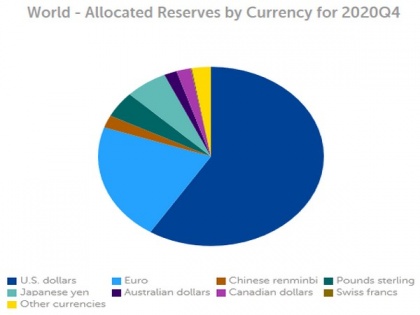US dollar share of global foreign exchange reserves drops to 25-year low: IMF
By ANI | Published: May 8, 2021 04:22 PM2021-05-08T16:22:35+5:302021-05-09T18:07:27+5:30
The share of US dollar reserves held by central banks fell to 59 per cent -- its lowest level in 25 years -- during the fourth quarter of 2020, according to a recent survey by the International Monetary Fund (IMF).

US dollar share of global foreign exchange reserves drops to 25-year low: IMF
The share of US dollar reserves held by central banks fell to 59 per cent -- its lowest level in 25 years -- during the fourth quarter of 2020, according to a recent survey by the International Monetary Fund (IMF).
Findings of the IMF's Currency Composition of Official Foreign Exchange Reserves (COFER) survey say this partly reflects declining role of US dollar in global economy in the face of competition from other currencies used by central banks for international transactions.
If the shifts in central bank reserves are large enough, they can affect currency and bond markets, said Serkan Arslanalp, Deputy Division Chief in balance of payments division of IMF's statistics department, and economist Chima Simpson-Bell.
The share of US dollar assets in central bank reserves dropped by 12 percentage points -- from 71 to 59 per cent -- since the euro was launched in 1999, they said in a blogpost posted on IMF's website.
Meanwhile, the share of the euro has fluctuated around 20 per cent while the share of other currencies including Australian dollar, Canadian dollar and Chinese renminbi climbed to 9 per cent in the fourth quarter.
However, the fact that value of US dollar has been broadly unchanged while its share of global reserves has declined indicates that central banks have indeed been shifting gradually away.
Some expect that US dollar's share of global reserves will continue to fall as emerging market and developing economy central banks seek further diversification of currency composition of their reserves. A few countries like Russia have already announced their intention to do so.
Despite major structural shifts in international monetary system over the past six decades, US dollar remains the dominant international reserve currency. Any changes to its status are likely to emerge in the long run.
( With inputs from ANI )
Disclaimer: This post has been auto-published from an agency feed without any modifications to the text and has not been reviewed by an editor
Open in app